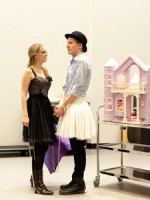Title
Bohemian Paris in the waning years of World War I: A restless spirit circulating through Montmartre on a warm summer’s evening, seemingly held together by a collective plume of cigarette smoke. Swarms of artists and other locals scouring the cafes and nightclubs for nocturnal thrills, always teetering between poverty and pleasure. This was the setting for the premiere, in June 1917, of Guillaume Apollinaire’s surrealist drama Les mamelles de Tirésias (The Breasts of Tirésias).
Body
Picasso, Cocteau, Satie, and Matisse were among the more conspicuous attendees at the debut, joined by a young Francis Poulenc (1899-1967), whose opéra bouffe of the same name would premiere at the Opéra-Comique in Paris exactly 30 years later. Poulenc would later write of Apollinaire’s Mamelles (at its heart a tale of a husband and wife who switch genders): “To tell the truth, although immensely amused by all of this, I would never have thought that this farce could one day occupy a significant place among my works.”
Luckily for present-day New York concertgoers, the young Frenchman’s initial impressions proved inconsequential. In December, Juilliard Opera will present Les mamelles de Tirésias, Poulenc’s operatic adaptation of Apollinaire’s play, with the original text as the libretto.
In his preface to Mamelles Apollinaire coined the term “surrealism”: “When man wanted to imitate walking, he created the wheel, which does not resemble a leg. He thus made surrealism without being aware of it.” With those words—and the play itself—Apollinaire inadvertently initiated a new movement, though he would not live to see it flourish, as he died in the 1918 flu pandemic. Like the later artists inspired by the countercultural Dadaist activities spawned during World War I, Apollinaire was decidedly anti-realist, immersed in the l’esprit nouveau in France that encouraged a new national ethos of experimentation and exploration in the arts and sciences. Mamelles encapsulates his convictions of patriotism and experimentation, capturing a coherent, progressive spirit beneath the sometimes bizarre surface elements.
“It’s easy to dismiss surrealism as merely wacky, [but] we forget that as a movement it had intense emotional impact, with deep roots in melancholy and discontent,” Emma Griffin, director of Juilliard’s production of Mamelles, said in a recent interview with The Journal. “Poulenc knew this—and he really navigates masterfully through this illogical landscape.”
Though Poulenc conceived of his two-act opera in the late 1930s, he primarily composed it when France was once again engulfed in war. It was 1944, and Allied troops had landed in Normandy and were battling to liberate France from Nazi occupation. Writing to the famed French baritone, Pierre Bernac, in June, Poulenc lamented, “I had always believed I would write Les Mamelles during a happy summer. It has, alas, been nothing of the sort.”
Composing in a crestfallen nation that was battered spiritually and physically from its second immersion in belligerence in a mere quarter century, Poulenc found deeper symbolic possibilities simmering under the absurd surface elements of Apollinaire’s text—the surrealism was an apt vehicle for reconciling the real-life absurdities accompanying the senseless cataclysm of war.
For audiences and performers alike, a surrealist libretto imbued with historical and cultural allusion might seem daunting to interpret, but Apollinaire insisted in his preface that “people are free to see in it all the symbols they wish, and to tease out a thousand meanings, as though it were a Delphic oracle.”
In the Juilliard production, second-year master’s soprano Meredith Lustig teases out a meaning for her role that sees beneath the comical aspects of her gender role reversal. “The core of the piece for me and my character is … feminism—women wanting to go out, conquer the world, and be everything,” she said. “In the end of the opera, my character comes back having had this transformation in herself, saying, ‘Yes, I’ve done everything, but it doesn’t mean anything unless you have love.’”
Lustig is one of two sopranos—the other is fellow master’s student Deanna Breiwick—who portray Thérèse, a frustrated housewife who, in an act of self-liberating metamorphosis, turns into a man toward the beginning of the opera. When Thérèse opens her blouse, two large balloons float to the ceiling signifying the denial of her domesticated womanhood and the beginning of her gender transformation.
“I think everyone can relate to a time when they felt boxed in, held back by people when you feel like you have so much more inside,” Breiwick said. Sympathetic to the emotions that must lie behind such a life-altering gender reversal, she added, “I think in this piece, even though it is so bizarre and fantastical, you still come down to finding out what is human.”
Thérèse, empowered by her new masculine identity, leaves to conquer the world as Tirésias, leaving behind her husband, Le Mari, now dressed as a woman. “I have four costumes and none of them involve pants,” said master’s baritone Timothy McDevitt, who plays Le Mari. In addition to the challenges posed by his wardrobe, McDevitt must accommodate two different sopranos playing Thérèse each night, which keeps him on his toes. “The shape of things is the same, but their own characterizations of who she is, and what our relationship is, is different. It keeps it hot—it’s spontaneous.”
Working across from McDevitt, Breiwick shares the feeling of spontaneity in switching places with Lustig. “It keeps things from getting stale,” she said. “We call ourselves a dysfunctional polygamous marriage.”





